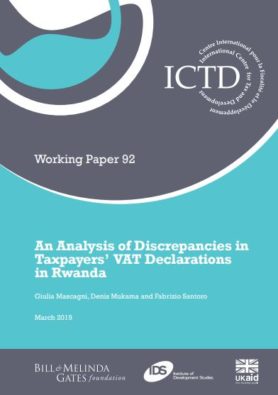Working Paper 92
This report provides a descriptive analysis of discrepancies resulting from matching different value added tax (VAT) data sources in the Rwanda Revenue Authority database. VAT returns are declared by businesses of all sizes and types, from companies to individual traders. Internal discrepancy is the gap between different data sources, namely VAT declaration and VAT annexes, for the same taxpayer. External discrepancy refers to the gap, for the same transaction, between buyer’s and seller’s reports. We summarise the extent and depth of these discrepancies, as well as any changes that have occurred since a new VAT refund claim validation procedure was introduced in January 2017, which mainly affected buyers’ reporting. While internal discrepancy does not seem to be an issue, external discrepancy is much more frequent, with just 18 per cent of our observations reporting the same VAT amount across buyers and sellers. This share rises to 40 per cent when buyers’ reports are compared to sellers’ electronic billing machine (EBM) records. The great majority of discrepancies are due to transactions not being reported at all by one of the trading partners. This analysis is purely descriptive and is meant to provide more information on these discrepancies, in view of potentially designing a further study to test possible policy measures to increase compliance on VAT using available administrative data.
Read the 2-page brief of this paper.

